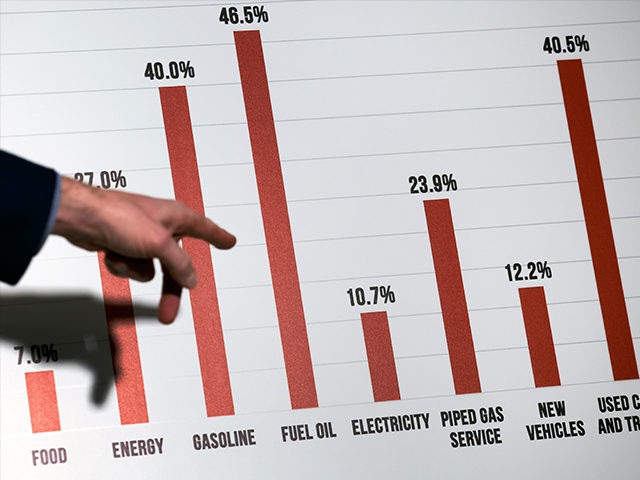The notion that the March Consumer Price Index marked peak inflation was dealt a sharp blow by the Federal Reserve’s Beige Book on Wednesday.
The Beige Book, a collection of anecdotal data gleamed by officials at the 12 regional banks from local business leaders, indicated that inflationary pressures not only remain strong in April but are expected to continue to push prices up at a rapid rate. From Boston to San Francisco, prices are rising. “Wages and output prices alike increased at a moderate pace, but some nonlabor input prices soared,” the Boston Fed’s report says.
“Inflationary pressures remained strong since the last report, with firms continuing to pass swiftly rising input costs through to customers,” the national summary says. “Firms in most Districts expected inflationary pressures to continue over the coming months.”
The information for the Beige Book, so-called because back in the era of ink-on-dead-trees it was published with a beige cover, was collected through April 11. So it presents a more real-time look at pricing pressures than last week’s Consumer Price and Producer Price indexes, which are published with a lag.
There was some evidence in the Beige Book of what economists call “demand destruction,” the phenomenon of high prices leading to lower sales. As the joke goes, everything got so expensive, no one could afford to buy anything. On balance, however, what appeared to be hurting sales the most is supply constraints both on materials and labor. One contact in trailer manufacturing told the St. Louis Fed that they “could double their sales if they had the workers.” This, of course, is a classic recipe for even more inflation.
The China lockdowns are already starting to be felt. China gets seven mentions in the Beige Book, all of which are about lockdowns hurting supply chains. The Atlanta Fed, for example, reports that lockdowns in China “diminished air carriers’ ability to move cargo in and out of the country.” From Chicago, we hear that “[m]anufacturing contacts continued to cite shortages of a wide range of inputs and expressed concern that the COVID-19 outbreak in China could cause further supply disruption.”

A worker wearing personal protective equipment rides a bicycle on a street during the COVID-19 lockdown in the Jing’an district in Shanghai on April 8, 2022. (HECTOR RETAMAL/AFP via Getty Images)

An aerial view of a residential area under COVID-19 lockdown in Shanghai’s Jing’an district on April 5, 2022. (HECTOR RETAMAL/AFP via Getty Images)
There’s also a creeping sense in the Beige Book that the risks to economic growth are now firmly on the downside. “Overall, business contacts have become less optimistic about the near-term outlook,” the New York Fed report notes. The Boston Fed even uses the R-word when discussing the outlook for commercial real estate: “Despite some optimism for the next few months, the outlook turned more pessimistic and uncertain, as contacts saw risks to activity from rising construction costs and interest rates, the war in Ukraine, and a possible recession.”
Demand for housing remains very strong, according to the Beige Book. Today’s report on existing home sales from the National Association of Realtors confirms that. The median price for a house sold in March hit its highest level recorded by the NAR in records going back to the 1960s. Overall sales are down, in large part because of a crash in sales of low-priced homes. That is likely caused by home price appreciation pushing homes into higher price categories and financial constraints due to inflation diminishing savings and higher mortgage rates hurting affordability. Million-dollar home sales are up by 15 percent from a year ago.
The housing market is a good illustration of why Biden’s economy has weighed so hard on his approval ratings. He ran on the promise of extending prosperity to more Americans. Instead, inflation has hit lower-income Americans hard, gasoline prices are sky-high, and homeownership is increasingly out of reach for a growing share of Americans. The number of Americans who say that now is a good time to make a major purchase is at an all-time low, according to the University of Michigan’s famous consumer sentiment survey.
This was not inevitable. The Biden administration could have listened to its critics, including many lifetime Democrats who have served in prior administrations, when they warned that the combination of the Fed’s easy money policy and the Biden administration’s reckless spending plans would send inflation soaring. Instead, the Biden administration ignored the Democrat critics and accused Republicans of engaging in scare-tactics. They fell into the trap of believing that all criticism of their policies was levied in bad faith. The results are now written across the Beige Book: inflation and fear that the risks of a recession are rising.

COMMENTS
Please let us know if you're having issues with commenting.